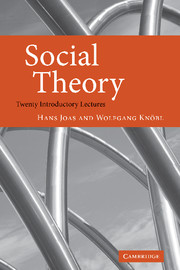Book contents
- Frontmatter
- Dedication
- Contents
- Introduction
- I What is theory?
- II The classical attempt at synthesis: Talcott Parsons
- III Parsons on the road to normativist functionalism
- IV Parsons and the elaboration of normativist functionalism
- V Neo-utilitarianism
- VI Interpretive approaches (1): symbolic interactionism
- VII Interpretive approaches (2): ethnomethodology
- VIII Conflict sociology and conflict theory
- IX Habermas and critical theory
- X Habermas' ‘theory of communicative action’
- XI Niklas Luhmann's radicalization of functionalism
- XII Anthony Giddens' theory of structuration and the new British sociology of power
- XIII The renewal of Parsonianism and modernization theory
- XIV Structuralism and poststructuralism
- XV Between structuralism and theory of practice: The cultural sociology of Pierre Bourdieu
- XVI French anti-structuralists (Cornelius Castoriadis, Alain Touraine and Paul Ricoeur)
- XVII Feminist social theories
- XVIII A crisis of modernity? New diagnoses (Ulrich Beck, Zygmunt Bauman, Robert Bellah, and the debate between liberals and communitarians)
- XIX Neo-pragmatism
- XX How things stand
- References
- Author index
- Subject index
II - The classical attempt at synthesis: Talcott Parsons
Published online by Cambridge University Press: 05 June 2014
- Frontmatter
- Dedication
- Contents
- Introduction
- I What is theory?
- II The classical attempt at synthesis: Talcott Parsons
- III Parsons on the road to normativist functionalism
- IV Parsons and the elaboration of normativist functionalism
- V Neo-utilitarianism
- VI Interpretive approaches (1): symbolic interactionism
- VII Interpretive approaches (2): ethnomethodology
- VIII Conflict sociology and conflict theory
- IX Habermas and critical theory
- X Habermas' ‘theory of communicative action’
- XI Niklas Luhmann's radicalization of functionalism
- XII Anthony Giddens' theory of structuration and the new British sociology of power
- XIII The renewal of Parsonianism and modernization theory
- XIV Structuralism and poststructuralism
- XV Between structuralism and theory of practice: The cultural sociology of Pierre Bourdieu
- XVI French anti-structuralists (Cornelius Castoriadis, Alain Touraine and Paul Ricoeur)
- XVII Feminist social theories
- XVIII A crisis of modernity? New diagnoses (Ulrich Beck, Zygmunt Bauman, Robert Bellah, and the debate between liberals and communitarians)
- XIX Neo-pragmatism
- XX How things stand
- References
- Author index
- Subject index
Summary
You will no doubt have already come across the founding fathers of sociology, the classical figures of the discipline, over the course of your studies or through your own reading. Indisputably, these include the German Max Weber (1864–1920) and the Frenchman Emile Durkheim (1858–1917). Their German contemporaries Georg Simmel (1858–1919) and Ferdinand Tönnies (1855–1936), and the Americans George Herbert Mead (1863–1931), William Isaac Thomas (1863–1947) and Charles Horton Cooley (1864–1929) are oft en mentioned in the same breath as the two disciplinary giants. Now we can argue till the cows come home about who else ought, or ought not, to be included in such a list of key authors, in the ‘canon’ of classical sociological theorists. The names of Adam Smith (1723–90) and above all Karl Marx (1818–83) crop up particularly oft en in this context and inspire intense controversy. Though not sociologists in a narrow sense, they have nonetheless had an enormous influence on sociological thought and, above all, on theory building in the social sciences as a whole.
As interesting as the debate on the classical status of certain authors may be, it is striking that the debaters tend to forget who was responsible for the formation of this canon, for drawing up this list of classical authors, who originally established the basic structure of the canon as pertains to this day. Should we examine this frequently neglected question, we will find that there is no getting away from the name of the American Talcott Parsons (1902–79).
- Type
- Chapter
- Information
- Social TheoryTwenty Introductory Lectures, pp. 20 - 42Publisher: Cambridge University PressPrint publication year: 2009



